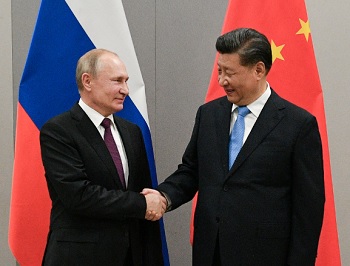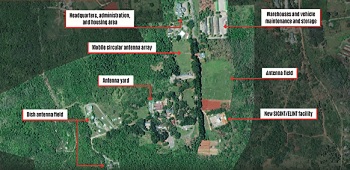International Affairs
 |
 |
 |
 |
 |
 |
 |
Russia and China: ‘No Limit’ Partnership
Russian president Vladimir Putin and Chinese leader Xi Jinping recently reaffirmed their “no-limits” partnership, which has deepened as both countries face rising tensions with the West. The two nations also criticized the U.S. military alliances in Asia and the Pacific.
 At their summit in Beijing in May, Putin thanked Xi for China’s proposals for ending the war in Ukraine, which have been rejected by Ukraine and its Western supporters as largely following the Kremlin’s line.
At their summit in Beijing in May, Putin thanked Xi for China’s proposals for ending the war in Ukraine, which have been rejected by Ukraine and its Western supporters as largely following the Kremlin’s line.
“Both sides wanted to show that despite what is happening globally, despite the pressure that both sides are facing from the U.S., both sides are not about to turn their backs on each other anytime soon,” said Hoo Tiang Boon, who researches Chinese foreign policy at Singapore’s Nanyang Technological University.
China and Russia also accused the U.S. of deploying land-based intermediate-range missile systems in the Asia-Pacific under the pretext of joint exercises with allies. They said the U.S. actions in Asia are “changing the balance of power” and “endangering the security of all countries in the region.”
Biden-Harris government accuses China of providing direct support to Russia’s military.
The U.S. State Department has also claimed that China is now directly supplying lethal military aid to Russia for use in Ukraine. Deputy Secretary of State Kurt Campbell leveled the accusation while visiting the NATO headquarters in Brussels, Belgium, an unwitting acknowledgment that Western assistance to Ukraine is strengthening Russia’s ties to the Chinese Communist Party (CCP).
U.S. officials said Beijing has supplied Russia with dual-use items and technologies beneficial to its defense sector. These items include semiconductor chips, machine tools, microelectronics, navigation equipment and jet parts.
According to Campbell, the materials Beijing is now supplying are not dual-use capabilities but essential components to bolster various elements of Russia’s military operations.
 Satellite images show Chinese electronic eavesdropping stations in Cuba are expanding, with new facilities constructed at a site about 70 miles from the U.S. military base at Guantanamo Bay.
Satellite images show Chinese electronic eavesdropping stations in Cuba are expanding, with new facilities constructed at a site about 70 miles from the U.S. military base at Guantanamo Bay.
Campbell emphasized that this collaboration includes exchanging technologies pertinent to submarine, aeronautic and missile development, which could negatively impact U.S. and allied security. He added that this cooperation signifies a fundamental alignment rather than a tactical alliance.
Additionally, the Deputy Secretary of State indicated that Russia appears to be assisting China in advancing its submarine and ship capabilities, which could significantly affect Chinese military deployments in the western Pacific. Despite the allegations, the State Department has yet to issue detailed evidence of such military aid and cooperation.
In August, the Biden-Harris government issued new sanctions to curb these Sino-Russian exchanges. The sanctions affected over 400 entities and individuals, including Chinese companies. China has condemned these measures as “typical unilateral sanctions” that disrupt global trade and destabilize supply chains.
Meanwhile, Russia’s space agency Roscosmos revealed that Putin and Xi are planning to put a nuclear power unit on the moon.
“Today we are seriously considering a project – somewhere at the turn of 2033-2035 – to deliver and install a power unit on the lunar surface together with our Chinese colleagues,” said Yuri Borisov, head of Russia’s space agency Roscosmos.
Borisov also confirmed that Russia is working on building a nuclear-powered space tugboat. “We are indeed working on a space tugboat. This huge, cyclopean structure that would be able, thanks to a nuclear reactor and high-power turbines to transport large cargoes from one orbit to another, collect space debris and engage in many other applications,” Borisov said.
Both countries have also agreed to collaborate closely on the UN-backed Lethal Autonomous Weapons Systems (LAWS) policy, a component of the Group of Governmental Experts (GGE) initiative.
This article was first published on WWIII.News on September 19, 2014. under the title “Russia and China reaffirm their 'no limit' partnership amid rising tensions with the West”
Read other articles by Ava Grace here


Communists never cease to be allies
“Both sides wanted to show that despite what is happening globally, despite the pressure that both sides are facing from the U.S., both sides are not about to turn their backs on each other anytime soon,” said Hoo Tiang Boon, who researches Chinese foreign policy at Singapore’s Nanyang Technological University.
China and Russia also accused the U.S. of deploying land-based intermediate-range missile systems in the Asia-Pacific under the pretext of joint exercises with allies. They said the U.S. actions in Asia are “changing the balance of power” and “endangering the security of all countries in the region.”
Biden-Harris government accuses China of providing direct support to Russia’s military.
The U.S. State Department has also claimed that China is now directly supplying lethal military aid to Russia for use in Ukraine. Deputy Secretary of State Kurt Campbell leveled the accusation while visiting the NATO headquarters in Brussels, Belgium, an unwitting acknowledgment that Western assistance to Ukraine is strengthening Russia’s ties to the Chinese Communist Party (CCP).
U.S. officials said Beijing has supplied Russia with dual-use items and technologies beneficial to its defense sector. These items include semiconductor chips, machine tools, microelectronics, navigation equipment and jet parts.
According to Campbell, the materials Beijing is now supplying are not dual-use capabilities but essential components to bolster various elements of Russia’s military operations.

Chinese bases in Cuba are expanding
Campbell emphasized that this collaboration includes exchanging technologies pertinent to submarine, aeronautic and missile development, which could negatively impact U.S. and allied security. He added that this cooperation signifies a fundamental alignment rather than a tactical alliance.
Additionally, the Deputy Secretary of State indicated that Russia appears to be assisting China in advancing its submarine and ship capabilities, which could significantly affect Chinese military deployments in the western Pacific. Despite the allegations, the State Department has yet to issue detailed evidence of such military aid and cooperation.
In August, the Biden-Harris government issued new sanctions to curb these Sino-Russian exchanges. The sanctions affected over 400 entities and individuals, including Chinese companies. China has condemned these measures as “typical unilateral sanctions” that disrupt global trade and destabilize supply chains.
Meanwhile, Russia’s space agency Roscosmos revealed that Putin and Xi are planning to put a nuclear power unit on the moon.
“Today we are seriously considering a project – somewhere at the turn of 2033-2035 – to deliver and install a power unit on the lunar surface together with our Chinese colleagues,” said Yuri Borisov, head of Russia’s space agency Roscosmos.
Borisov also confirmed that Russia is working on building a nuclear-powered space tugboat. “We are indeed working on a space tugboat. This huge, cyclopean structure that would be able, thanks to a nuclear reactor and high-power turbines to transport large cargoes from one orbit to another, collect space debris and engage in many other applications,” Borisov said.
Both countries have also agreed to collaborate closely on the UN-backed Lethal Autonomous Weapons Systems (LAWS) policy, a component of the Group of Governmental Experts (GGE) initiative.
Read other articles by Ava Grace here
Posted September 27, 2024

______________________
______________________
 Volume I |
 Volume II |
 Volume III |
 Volume IV |
 Volume V |
 Volume VI |
 Volume VII |
 Volume VIII |
 Volume IX |
 Volume X |
 Volume XI |
 Special Edition |


